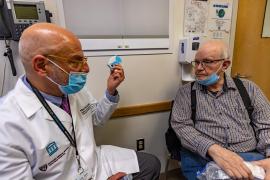Low-, Middle-Income Countries Could Receive Donated H1N1 Vaccine Shipments By November, WHO Says
About 100 low- and middle-income countries could receive donated shipments of the H1N1 (swine flu) vaccine as early as November, Marie-Paule Kieny, of the WHO, told journalists Monday, Agence France-Presse reports. "Dozens of millions of doses are being lined up following offers from pharmaceutical companies," including Sanofi-Aventis, GlaxoSmithKline and MedImmune, as well as a coalition of developed nations "that have pledged to release 10 percent of their vaccine purchases for poor nations," the news service writes (10/12).
"We are trying to have a first delivery starting in November," Kieny said, according to Reuters. "The idea is to start with northern hemisphere countries first." Kieny reemphasized the importance of health workers in these countries being first in line to receive the vaccine "to avoid passing it to the patients they treat and to ensure that hospitals and health clinics can stay open throughout an outbreak," the news service writes. Though H1N1 production yields continue to be lower than those of the seasonal flu vaccine, Kieny said the manufacturers of the H1N1 vaccine have been able to produce more vaccine than originally anticipated (MacInnis, 10/12).
In related news, the Namibian/allAfrica.com examines efforts currently underway in Namibia to ensure the country acquires the H1N1 vaccine from the WHO. "To date, 69 cases of the flu have been confirmed in Namibia, with the number of new cases reported per week having come down slightly in the past few weeks," the news service writes, adding "WHO says vaccine supplies in many low- and middle-income countries - such as Namibia - will 'depend on donations from manufacturers and other countries'" (Shejavali, 10/9).
Meanwhile, on Friday, the WHO announced it could take several years before the organization could downgrade the H1N1 classification "from a pandemic to seasonal-like virus," Reuters reports in a separate story. "Eventually a pandemic virus becomes more like a seasonal virus and that normally will take something like two to three years," WHO spokesperson Gregory Hartl said. "Once enough people either have been vaccinated or have contracted the virus, then it becomes more difficult to spread. It starts acting like a seasonal flu." Hartl warned there was no sign the virus had started to slow down (MacInnis, 10/9).
This is part of the Morning Briefing, a summary of health policy coverage from major news organizations. Sign up for an email subscription.





